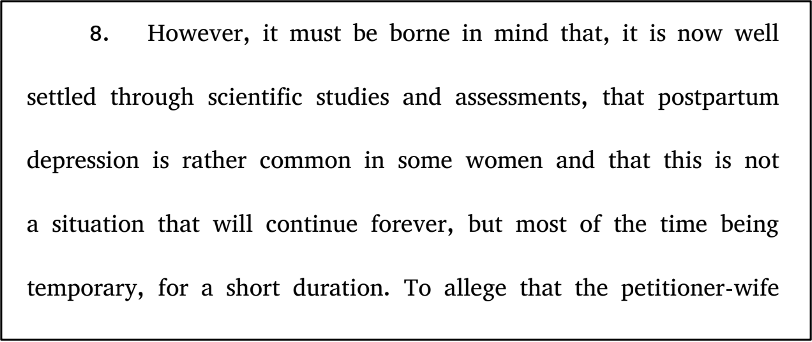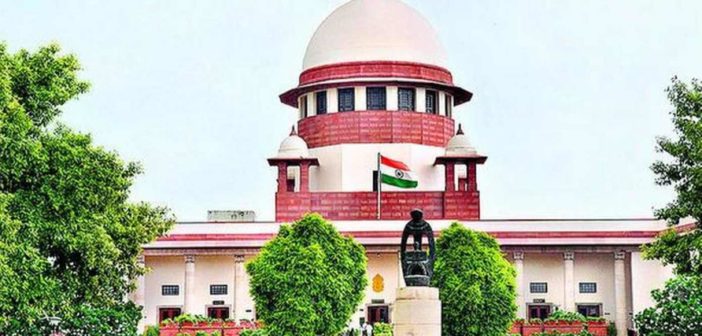In this edition of the Court judgments review, we look at the SC’s decision that compassionate appointment is not a vested right and must be based on the relevant rules/guidelines, Calcutta HC’s decision that a promise of marriage, even if unfulfilled, does not amount to fraud if the sexual relationship was entered into consensually and without deceit, Bombay HC’s order that daughters do not have inheritance rights in father’s property if he died before 1956, among others.
SC: Compassionate appointment is not a vested right and must be based on the relevant rules/guidelines
The matter before the Supreme Court in Tinku vs. State of Haryana was regarding the appointment of the petitioner on compassionate grounds in Haryana Police. Tinku’s father was a constable in Haryana Police who passed away in November 1997. At the time of his father’s demise, Tinku was just seven years old. Back then, the Haryana Government had a policy in place for granting compassionate appointments to the dependents of deceased employees, but it restricted such appointments to Class III and IV posts. Tinku’s mother, being illiterate, was unable to apply for compassionate employment herself and thus sought the appointment for her son.
A communication from the Director General of Police in 1998 confirmed that Tinku’s name was entered in the Minor’s Register, indicating that a job would be reserved for him once he reached adulthood. Upon reaching the age of majority in 2008, Tinku and his mother approached the authorities again, seeking appointment. However, the authorities rejected the claim, citing that the application was time-barred as per the Haryana Government’s policy, which allowed dependents to seek compassionate appointments only within three years of the employee’s death. When he approached the High Court in 2009, it dismissed his petition citing the above policy. He then approached the Supreme Court.
The Supreme Court bench of Justices Abhay S Oka, Ahsanuddin Amanullah and Augustine George Masih upheld the rejection of the compassionate appointment, ruling that Tinku’s claim was rightly time-barred as it had been made 11 years after his father’s death. The Court emphasized that compassionate appointment is not a vested right and must adhere to the guidelines set out in relevant rules. The Court also observed that claims for compassionate appointments must be made within the stipulated time, as per the Haryana Government’s 1999 policy. However, the Court found that the family was not properly informed about the ex-gratia compensation option available under earlier rules. In a just and reasonable decision, the Court allowed Tinku’s mother to submit a representation for the ex-gratia lump sum compensation.
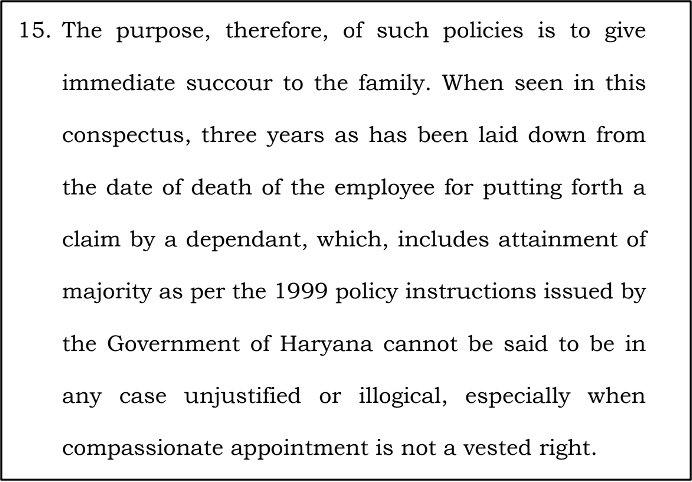
Calcutta HC: A promise of marriage, even if unfulfilled, does not amount to fraud if the sexual relationship was entered into consensually and without deceit
In the case, Biswanath Murmu vs. the State of West Bengal, the appellant was charged under Sections 376 (rape), 493 (cohabitation by deceitful promise of marriage), and 417 (cheating) of the IPC. A woman had filed a case against him claiming that she and the appellant were in a romantic relationship, eloped, and engaged in sexual relations several times, under the appellant’s promise of marriage. She became pregnant and when she informed the appellant about it, she claimed that he insisted on abortion and refused to marry her. She then filed a complaint against him with the police when she was nine months pregnant. The appellant was convicted in a lower court which sentenced him to suffer rigorous imprisonment for 7 years and a fine of Rs.1000. He then filed an appeal before the Calcutta High Court.
In the High Court, the appellant argued that the sexual relationship was consensual. The woman had consented to the intimacy without any objection, and the promise of marriage was not a fraud. The appellant contended that consent obtained through a promise of marriage does not constitute rape. On the other side, the prosecution argued that the appellant’s refusal to marry the victim after getting her pregnant amounted to deceit and constituted rape and cheating.
Justice Ananya Bandopadhyay of Calcutta HC observed that the relationship was consensual. Further, the Court noted that the woman was an adult who willingly engaged in the sexual relationship and was aware of its consequences. As the victim’s consent was not obtained by fraud or coercion, the Court noted that the allegations did not fall within the definition of rape under Section 375 of the IPC. It also noted that the prosecution did not submit corroborative evidence such as a DNA test to establish the paternity of the child. The court allowed the appeal and acquitted the appellant.
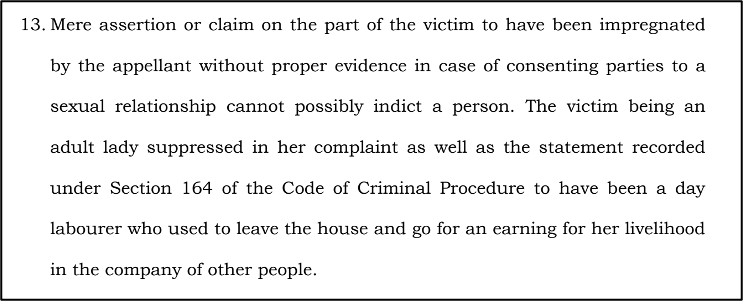
Delhi HC: Academic impact on children is not a valid reason for non-compliance with transfer order
In the case, Ravinder Mandal vs. DLF Universal Ltd., the petitioner was a Senior Foreman with the respondent company for almost 10 years. He claimed that after refusing to assist his employer in currency exchange during demonetization, he was subjected to vindictive actions. He was transferred from Delhi to Chennai in January 2017 which he refused to accept. He cited that the timing of the transfer would have harmed his children’s education. Further, he also stated that he was not given facilities related to transfer as per the HR Manual. He was subsequently denied permission to continue his duties in Delhi.
The petitioner approached the Labour Court stating that his services were terminated under the guise of a transfer. However, the respondent management contended that the transfer was due to administrative reasons, not a termination. The Labour Court ruled that the petitioner was a “workman” under the Industrial Disputes Act, as his duties were not managerial in nature. It also concluded that the evidence showed the petitioner’s services were not terminated, but he was transferred to Chennai as per the terms of his appointment. However, he refused to comply with the transfer order.
Dissatisfied with the order, he approached the Delhi High Court. Justice Girish Kathpalia observed that the petitioner had refused to comply with the transfer order and did not request the required relocation expenses as per the Manual. The Court also noted that complying with the transfer order would not have caused academic damage for the children, aged 6 years and 4 years. The High Court upheld the Labour Court’s decision and dismissed the petition.
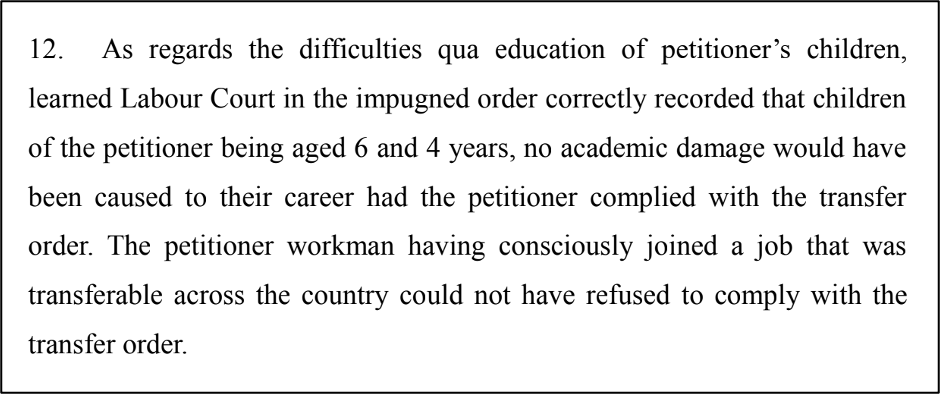
Bombay HC: Daughters do not have inheritance rights in father’s property if he died before 1956
In the case, Radhabai Shirke vs. Keshav Jadhav, the matter before the Bombay High Court was regarding the inheritance of property by daughters. The facts of the case are as follows: Yeshwantrao had two wives, Laxmibai and Bhikubai, and three daughters: Sonubai and Radhabai from his first marriage to Laxmibai, and Champubai from his second marriage to Bhikubai. Yeshwantrao passed away in 1952, followed by his second wife Bhikubai in 1973, who had executed a will in favour of her daughter Champubai. Radhabai, his daughter from the first marriage, filed a suit claiming half of her father’s property, asserting her right to inherit along with Bhikubai.
The Trial Court, however, dismissed her claim, ruling that Bhikubai inherited the entire property under the Hindu Women’s Right to Property Act, 1937, and became the absolute owner after the Hindu Succession Act, 1956, came into force. The appeal filed by Radhabai was also dismissed, which led to the current second appeal.
The core matter before the High Court was whether a daughter, whose father died before 1956, had inheritance rights under the laws prevailing at the time. The Bench of Justices A S Chandurkar and Jitendra Jain examined whether the provisions of the Hindu Women’s Right to Property Act, 1937, which explicitly referenced only sons, allowed a daughter to inherit her father’s property. Referring to some past judgements, the Court rejected the argument that a daughter had inheritance rights, emphasizing that the 1937 Act did not include daughters as heirs and that inheritance rights for daughters were only recognized under the Hindu Succession Act, 1956, which did not apply retroactively. The Court held that since Yeshwantrao died before the enactment of the 1956 Act, his property devolved according to the pre-1956 laws, which did not recognize daughters as heirs if there was a surviving widow.
Thus, the Court ruled that Radhabai, as the daughter of Yeshwantrao, had no inheritance rights to her father’s property under the laws applicable at the time of his death in 1952. The matter was sent back to a single judge to resolve the remaining aspects of the case.
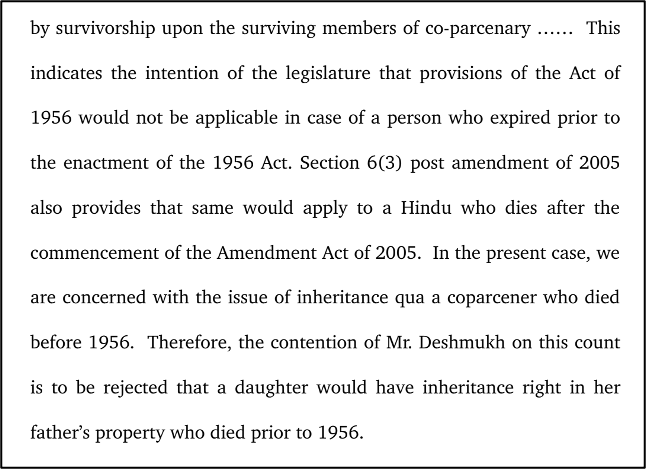
Kerala HC: Postpartum depression is not grounds for giving permanent custody of child to father
In a case before the Kerala High Court, the petitioner, the mother of a 1.5-year-old child, challenged the orders passed by the Family Court, Mavelikkara, regarding the custody of her child. The respondent (father) had filed a petition seeking permanent custody of the child and to modify an earlier order that granted him interim custody on certain days. The Family Court allowed the respondent’s applications after a prima facie finding that the mother was suffering from psychiatric disorders, particularly postpartum depression, and ruled that the child should be handed over to the father.
However, the petitioner argued that the Family Court’s conclusion regarding her psychiatric condition was unjustified and unsupported by facts. She contended that the child was still nursing and unwilling to go to the father and that removing him would cause emotional harm and distress. She further claimed that there was no concrete evidence to show that she was suffering from any psychiatric disorder. In response, the respondent argued that the petitioner was suffering from postpartum depression and lacked affection for the child, submitting medical records to support his claim.
Upon reviewing the case, the court noted that the medical records provided by the respondent only showed that the petitioner had experienced postpartum depression shortly after childbirth, which is typically a temporary condition. The court found that there was insufficient evidence to justify the Family Court’s conclusion that the mother was suffering from a long-term psychiatric disorder.
The petitioner voluntarily agreed to undergo a medical evaluation, which was conducted by a board at the Government Medical College, Ernakulam. The evaluation concluded that the petitioner showed no signs of major psychiatric disorders. The court allowed the petitioner’s appeal, set aside the Family Court’s orders, and remanded the case for reconsideration of the custody matter.
